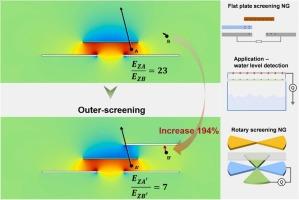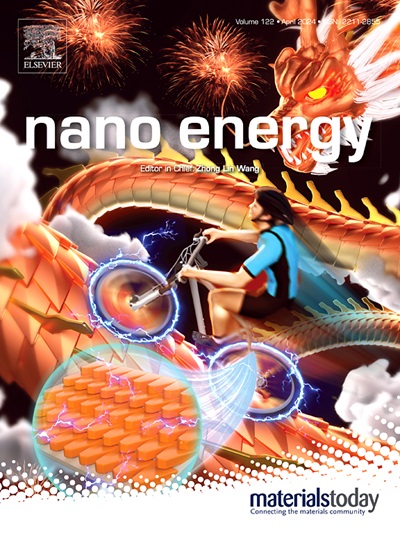基于水层筛选效应的筛选纳米发电机
IF 17.1
1区 材料科学
Q1 CHEMISTRY, PHYSICAL
引用次数: 0
摘要
长期以来,静电被认为是一种负面效应,直到摩擦电纳米发电机(TENG)的发明,人们才利用摩擦通电来收集动能并将其转化为电能。一般来说,摩擦起电易受湿度的影响,但这种影响机理尚未完全弄清楚。事实上,澄清物理将有助于新设备的设计。本文梳理了湿度对TENG的影响机制,并通过其特征时间进行了区分。在此基础上,结合传统的非接触式纳米发电机结构,利用水层的筛选效应设计了一种筛选型纳米发电机。研究了不同位置的筛板对系统的影响。令人惊讶的是,外部审查委员会也可以影响系统。因此,设计了一种外筛传感器,用于检测物质的电荷状态和监测水位。本工作为进一步了解湿度与表面电荷的相互作用原理建立了新的模式,并提出了设计耐湿TENG的不同策略。同时,提出了基于非朗道体系的多体电荷相互作用的研究前沿,希望对更多的学者有所启发。本文章由计算机程序翻译,如有差异,请以英文原文为准。

Screening nanogenerator based on the screening effect of water layer
Electrostatics was considered to be a negative effect a long time ago, people never used frictional electrification to collect kinetic energy and convert it into electrical energy until the invention of the triboelectric nanogenerator (TENG). Generally speaking, triboelectrification is susceptible to humidity, but this influence mechanism has not yet been fully figured out. In fact, clarifying the physics will be conducive to the design of new devices. In this work, we sort out the influencing mechanisms of humidity on TENG, and differentiate them by their characteristic time. Based on this analysis and the traditional non-contact nanogenerator structure, a screening nanogenerator is designed utilizing the screening effect of water layer. The effects of screening boards in different locations on the system are studied. Surprisingly, the outside screening board can also influence system. Therefore, an outside screening sensor is designed for detecting the charge state of matter and monitoring water levels. This work builds a new mode for further understanding about interaction principle of humidity and surface charge, and presents a different strategy to design humidity-resistant TENG. Meanwhile, the research frontier of many-body charge interaction based on non-Landau system is raised, hoping to inspire more scholars.
求助全文
通过发布文献求助,成功后即可免费获取论文全文。
去求助
来源期刊

Nano Energy
CHEMISTRY, PHYSICAL-NANOSCIENCE & NANOTECHNOLOGY
CiteScore
30.30
自引率
7.40%
发文量
1207
审稿时长
23 days
期刊介绍:
Nano Energy is a multidisciplinary, rapid-publication forum of original peer-reviewed contributions on the science and engineering of nanomaterials and nanodevices used in all forms of energy harvesting, conversion, storage, utilization and policy. Through its mixture of articles, reviews, communications, research news, and information on key developments, Nano Energy provides a comprehensive coverage of this exciting and dynamic field which joins nanoscience and nanotechnology with energy science. The journal is relevant to all those who are interested in nanomaterials solutions to the energy problem.
Nano Energy publishes original experimental and theoretical research on all aspects of energy-related research which utilizes nanomaterials and nanotechnology. Manuscripts of four types are considered: review articles which inform readers of the latest research and advances in energy science; rapid communications which feature exciting research breakthroughs in the field; full-length articles which report comprehensive research developments; and news and opinions which comment on topical issues or express views on the developments in related fields.
 求助内容:
求助内容: 应助结果提醒方式:
应助结果提醒方式:


